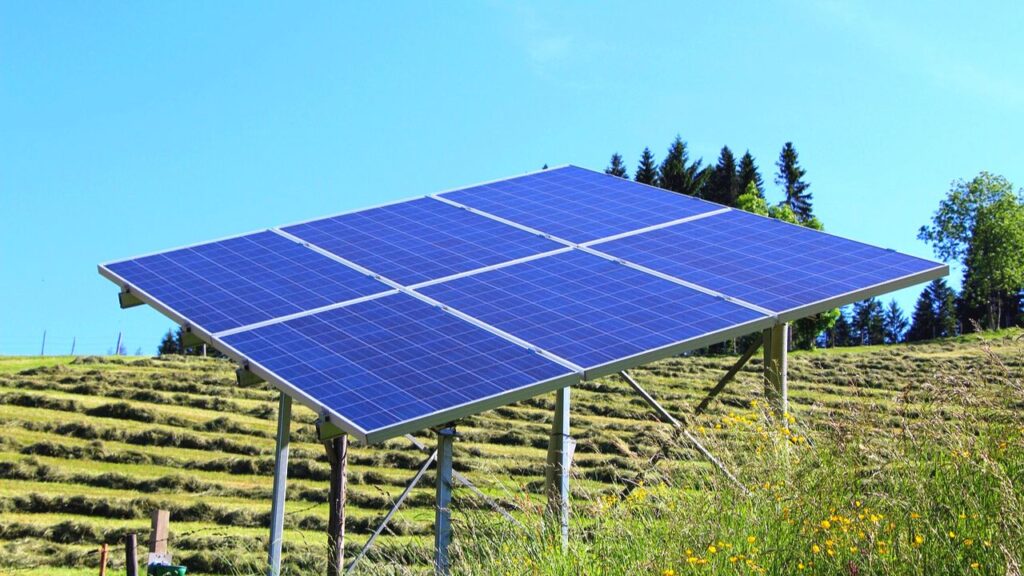Solar energy has become one of the most popular renewable sources in recent years. The use of solar power has become increasingly common in homes and businesses, with the potential to reduce our reliance on non-renewable sources of energy. In this article, we will explore how solar energy works, from the sun’s rays to electricity in your home. We will look at the different components of a solar panel system and how they work together to convert sunlight into usable energy.
Table of Contents
The Basics of Solar Energy
Solar energy is renewable energy derived from the sun’s rays. The sun emits energy through electromagnetic radiation, including visible, ultraviolet, and infrared radiation. Solar panels are designed to capture and convert this energy into usable electricity. Here’s how solar energy works in a nutshell:
- Sunlight is absorbed by solar panels comprising photovoltaic (PV) cells.
- The PV cells convert the sunlight into direct current (DC) electricity.
- The DC electricity is sent to an inverter, which converts it into alternating current (AC) electricity used in your home.
- Any excess electricity produced can be stored in batteries for later use or sent back to the grid for others to use.
Components of a Solar Panel System
To fully understand how solar energy works, it’s essential to understand the different components of a solar panel system and how they work together. Here are the main components of a solar panel system.
Solar Panels

Solar panels are the most visible component of a solar panel system. Solar panels are made up of PV cells that convert sunlight into electricity. They are usually mounted on a roof or ground where they can receive the most sunlight.
Inverter

The inverter is a crucial component of a solar panel system because it converts the DC electricity produced by the PV cells into AC electricity that can be used in your home.
Battery storage

Some solar panel systems include battery storage, which allows you to store any excess electricity produced for later use. This is particularly useful for homes that use a lot of electricity during the evening or at night when the sun is not shining.
Monitoring system

A monitoring system allows you to track how much electricity your solar panel produces and uses. This information can help you adjust your energy usage and maximise your solar panel system.
Advantages of Using Solar Power
There are many advantages to using solar power as a renewable energy source. Here are some of the main advantages:
Cost savings
Using solar power can save money on your electricity bills. While there is an initial cost to installing a solar panel system, over time, it can pay for itself in savings on your electricity bills.
Environmental benefits
Solar power is a clean energy source that does not produce greenhouse gas emissions. Solar power can help reduce your carbon footprint and improve your environment.
Energy independence
By using solar power, you can become less reliant on non-renewable sources. This can help protect you from rising energy prices and ensure that you have a reliable energy source.
FAQs about Solar Energy
How much energy can a solar panel system produce?
The amount of energy that a solar panel system can produce depends on several factors, including the size and efficiency of the panels, the amount of sunlight they receive, and the location of the panels. In general, a well-designed solar panel system can produce enough electricity to meet the needs of a typical household.
What happens if there isn’t enough sunlight?
Solar panels are designed to capture sunlight, but they can still produce some electricity on cloudy days or when there is less sunlight. However, the electricity produced will be less than on a sunny day. If your solar panel system is not producing enough electricity, you may need to supplement it with electricity from the grid.
Can solar panels work in cold climates?
Solar panels can still work in cold climates, but their efficiency may be reduced. Solar panels can work better in cold temperatures than in hot temperatures. However, it’s essential to ensure that snow and ice do not accumulate on the panels, which can block sunlight and reduce efficiency.
Are there any disadvantages to using solar power?
While there are many advantages to using solar power, there are also some disadvantages. One disadvantage is the initial cost of installing a solar panel system. While the cost has come down in recent years, it can still be a significant investment. Another disadvantage is that solar panels are not always able to produce electricity when needed, such as during the evening or at night.
Conclusion
Solar energy is a clean, renewable source of energy that has the potential to transform the way we power our homes and businesses. By understanding how solar energy works, we can make informed decisions about investing in a solar panel system and how to get the most out of it. With the right equipment and installation, solar power can be a cost-effective and reliable source of electricity for years to come.
